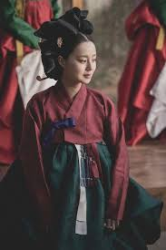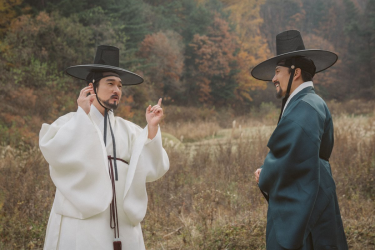I had a kind of uncanny feeling watching this Korean historical drama about a noble geomancer who is betrayed by his corrupt peers who mis-advise the king in order to reinforce their power: It’s a whole lot like the delightful The Princess and the Matchmaker. And, as it turns out, both are part of a thematic trilogy from Korean company Jupter Film, the first entry of which 2010’s The Face Reader. In each film, honest purveyors of a traditional Korean practice are met with corruption and deception from their fellows.

“I’ve seen these hats before…”
Which, as I pointed out in the previous review, just couldn’t be done here. Can you imagine a modern American film where an honest geomancer was betrayed by the self-serving members of the court in order to weaken the kingdom? It has to start from the premise that there’s an honest art to be practiced and corrupted.
Where The Princess and the Matchmaker starts out light and gets increasingly darker and more serious as the film progresses, this movie launches with the prince being poisoned. His grieving father and young son search for a proper burial place with the help of the court Fengshui masters, because burying the body in a propitious location will lead to good things for the family while burying it in a bad one could spell disaster. The court geomancers, however, are working with the Kims—the family behind the assassination—and mis-direct the king.
At the site of the burial, however, young Jae-sang objects: This is a terrible site, he says, which will bring misery on your family. The correct site is somewhere over…there. He is immediately corrected and later reprimanded and thrown out of the corps. This doesn’t bother him too much, however, because he really is skilled and knows he can find plenty of work. And being true is more important than fancy digs at the court. His buddy razzes him for not even having an outhouse, as they go for a whiz.
And then, while they’re bro-ing it up a discrete distance away, his wife and child are murdered, and his house set aflame.

This is a different woman, but her fate is also not propitious.
So, we’re already much darker than TPatM in the opening act. What’s more, this has become…a revenge picture. As I’ve observed previously, Korean revenge pictures are not fun or cathartic like Western revenge pictures. The moral of all of them is pretty much: You may or may not get it, but in the process, you will destroy yourself and everything you love.
In this movie, we flash forward 13 years, when Jae-san has a prosperous business (if lonely life) using his geomancy to help people decide where to live and how to set their businesses up for best results. In a particular scene, he helps the owners of a mall by telling them how to arrange their stores, and it seems a whole lot less like geomancy than good business sense. But it’s a good demonstration of his skills. Meanwhile, the new king (the son of the poisoned one) is a young man, floundering, childless and weak.
They team up with a low member of the royal family who is literally treated like a dog by the Kims in order to set things right, and what follows is a fun ensemble picture where the team works together to uncover a far-reaching conspiracy which involves the Kim family strategically burying their dead in propitious locations while misdirecting the ruling family so that they get increasingly weak.

This spot is perfect…except that it’s in Korea.
Relatively light-hearted caper antics give way to darker and darker deeds which give the movie a real resonance, as you grow to like all the protagonists. The third act climax is especially good because two of our heroes have to choose whether to continue down the path of destruction—which will lead to the fall of Korea, no less!—or choose a more rational path.
This is a drama which (like the fanciful Detective Dee) weaves in a known event (a short-lived Korean at the turn of the 20th century), so that particular resonance is lost on those of us who are not up on their Korean history, and we were a little surprised when the movie—with its horses and swordplay—flashes forward to the end of our two buddies’ lives, and they are very clearly in the industrial age, still advising people. And, of course, working to help Korea free itself from Japan’s rule—the consequences of the wrong choices being made decades earlier.
We greatly enjoyed it, though we all had the problem of (as I put it), “Aw, crap, there’s another Korean dude with a beard and a hat…”, because (just like with American movies set in the ’50s) everyone ends up looking alike. But the funny thing was that we were all able to sort it out as the movie went on because the characters were well drawn. So, we’d get lost, but we’d find our way out. At one point, the hero, who has been easily identifiable by his white clothing, changes his color. This was confusing at first, but then also becomes significant as it really signals his departure from the righteous path.

And suddenly we’re in the 20th century!
It’s gotten mixed reviews from critics, especially for some of the performances, but such subtleties were lost on us. It is, of course, beautifully shot and really burns through its 2:20 runtime, which was good, because we were off to see The Negotiation next.
